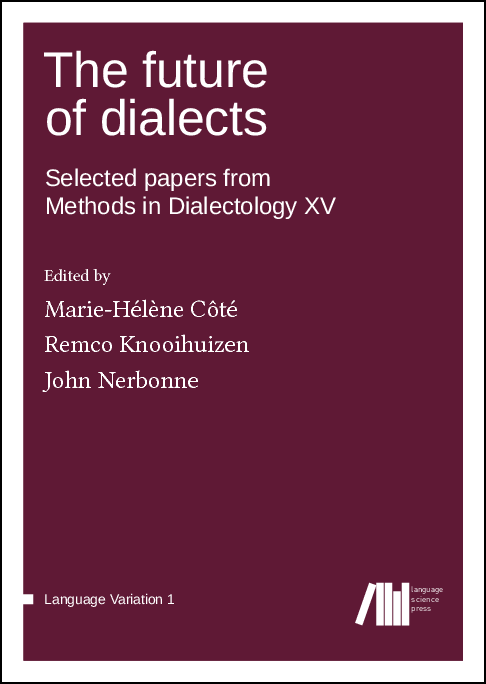We log anonymous usage statistics. Please read the privacy information for details.
The future of dialects: Selected papers from Methods in Dialectology XV
Keywords:
dialectology, sociolinguistics, language variation, linguistic methodology, quantitative linguisticsSynopsis
Traditional dialects have been encroached upon by the increasing mobility of their speakers and by the onslaught of national languages in education and mass media. Typically, older dialects are “leveling” to become more like national languages. This is regrettable when the last articulate traces of a culture are lost, but it also promotes a complex dynamics of interaction as speakers shift from dialect to standard and to intermediate compromises between the two in their forms of speech. Varieties of speech thus live on in modern communities, where they still function to mark provenance, but increasingly cultural and social provenance as opposed to pure geography. They arise at times from the need to function throughout the different groups in society, but they also may have roots in immigrants’ speech, and just as certainly from the ineluctable dynamics of groups wishing to express their identity to themselves and to the world.
The future of dialects is a selection of the papers presented at Methods in Dialectology XV, held in Groningen, the Netherlands, 11-15 August 2014. While the focus is on methodology, the volume also includes specialized studies on varieties of Catalan, Breton, Croatian, (Belgian) Dutch, English (in the US, the UK and in Japan), German (including Swiss German), Italian (including Tyrolean Italian), Japanese, and Spanish as well as on heritage languages in Canada.
Chapters
-
Embracing the future of dialects
-
Heritage languages as new dialects
-
From diglossia to diaglossiaA West Flemish case-study
-
The future of Catalan dialects' syntaxA case study for a methodological contribution
-
Fuzzy dialect areas and prototype theoryDiscovering latent patterns in geolinguistic variation
-
On the problem of field worker isoglosses
-
A new dialectometric approach applied to the Breton language
-
Tracking linguistic features underlying lexical variation patternsA case study on Tuscan dialects
-
Automatically identifying characteristic features of non-native English accents
-
Mapping the perception of linguistic formDialectometry with perceptual data
-
Horizontal and vertical variation in Swiss German morphosyntax
-
Infrequent forms: Noise or not?
-
Top-down and bottom-up advances in corpus-based dialectometry
-
Imitating closely related varieties
-
Spontaneous dubbing as a tool for eliciting linguistic dataThe case of second person plural inflections in Andalusian Spanish
-
Dialect levelling and changes in semiotic space
-
Code-switching in the Anglophone community in Japan
-
Tongue trajectories in North American English /æ/ tensing
-
s-retraction in Italian-Tyrolean bilingual speakersA preliminary investigation using the ultrasound tongue imaging technique
-
Developing the Linguistic Atlas of Japan Database and advancing analysis of geographical distributions of dialects
-
Tracing real and apparent time language changes by comparing linguistic maps
-
Timespan comparison of dialectal distributions
-
Tonal variation in Kagoshima Japanese and factors of language change
Reviews
-
Review in Dialectologia
by Wladyslaw Cichocki
published September 1, 2016
[T]his volume illustrates very effectively that current dialectological inquiry is a dynamic, multidisciplinary enterprise that continues to adapt exciting methodological innovations. The success of the volume in communicating this dynamism is due in no small part to the careful work of the co-editors and of the large group of referees who have ensured the high quality of these papers.
-
Review on LinguistList
by Marco Caria
published October 23, 2017
“The Future of Dialects” is an innovative book for all the dialectologists who want to use dialectometry for their research. [...] [T]he papers contained in the volume should be read not only for their intrinsic value, but also as a guide in conducting studies of variationist linguistics, covering the matters of areal, social and historical changes in dialects.
-
Review in Language Dynamics and Change 7 (2)
by Frans Hinskens
published January 1, 2017
[...] the overwhelming majority of the contributions do not discuss the future of dialects [...] but rather dialect research, more specifically techniques which may play a role in the future of dialect research. And in that respect the volume has very much of interest to offer. So maybe the title should have rather been The future of dialectological research, or even Future methods of dialectological research
-
Review in Zeitschrift für Dialektologie und Linguistik LXXXV (3)
by David Clement
published January 1, 2018
The editors give a survey of the aspects of dialectology covered in this volume, [which] even includes articles which seem to extend beyond the usual definition of dialects, for example, Naomi Nagy’s [work on] 'Heritage languages' [...], Keiko Hirano’s [on] 'Code-switching' [and Bloem et al. on "characteristic features of accents




